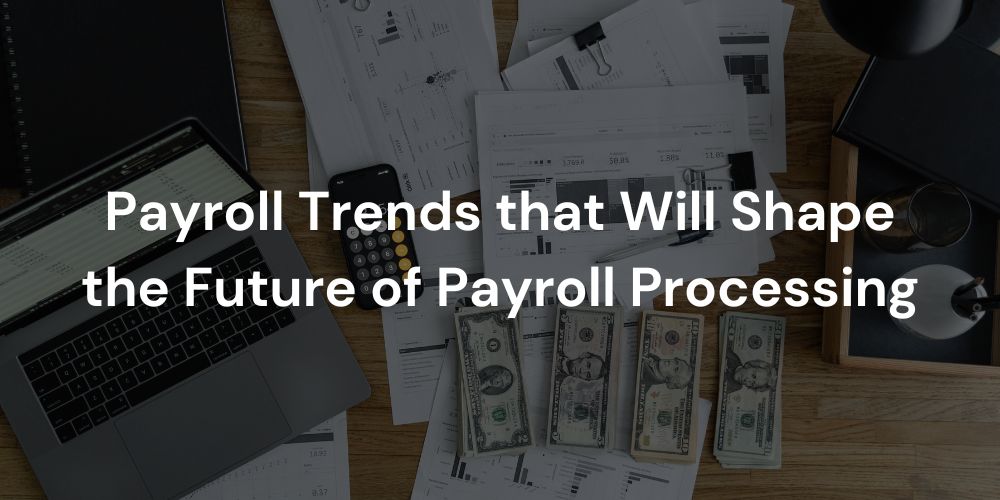Payroll Trends that Will Shape the Future of Payroll Processing


Payroll is an essential component of any business. To ensure accurate remuneration for your workforce, your payroll system keeps track of payroll taxes, business parks, and other deductions. There has not always been a payroll industry innovator. On the other hand, payroll systems are evolving to accommodate new technology that enables more seamless payroll processing and shifting work patterns.
Keep up with the most recent payroll trends, whether you outsource your payroll processing or do it internally. We’ll go over 12 payroll trends to keep an eye on can manage this task for your company.
Read more: Top 10 Payroll Tips for Small Business Owners
1. Payroll is adapting to the gig economy
Because freelance work is rising, payroll systems must adapt to a broader range of worker types, including independent contractors. Non-salaried employees may expect real-time or on-demand payments rather than waiting two weeks or a month for a regular pay period, among other changes. As payroll processing speeds up, HR and department managers must have quick problem-solving skills.
“A gig economy is a labor market that relies heavily on temporary and part-time positions filled by independent contractors and freelancers rather than full-time permanent employees”.
“Instant payments are becoming more and more popular as an option for hourly workers – getting paid instantly, or nearly immediately after they’ve finished a shift,” said Ravi Dehar, head of marketing for fintech company Plaid.
With mobile payments, employers can pay employees more quickly. This feature is available in popular applications such as PayPal and Venmo. Payroll administrators must be aware of these arrangements’ challenges, particularly when computing taxes and tracking payments and cash flow.
2. Payroll is being shifted to the cloud.
Cloud computing has transformed how we work by allowing us to access data from any device in any location with an internet connection. It has enabled several SaaS (software as a service) business models for data storage, backup, and enterprise software. Gartner predicts that by 2025, cloud apps will account for more than half of commercial IT investment in significant market categories. Payroll is no exception.
“The term “cloud” refers to servers that can be accessed via the Internet and the software and databases that run on those servers. Cloud servers are housed in data centers worldwide. Using cloud computing, users and companies do not have to manage physical servers or run software applications on their own machines”.
Payroll organizations are increasingly using the cloud to run their operations, according to Dehar. If it hasn’t already, going to a bank branch to process payroll will soon be a thing of the past for most business owners.
Payroll systems delivered via the cloud have several advantages, especially for small businesses with limited resources. According to Angelo Frisina, founder and CEO of Sunlight Media LLC, two major advantages are cost savings and flexibility.
According to him, as a business grows, it can increase its use of cloud services as needed without purchasing additional hardware and with little to no software.
Furthermore, cloud solutions include automated and regular software updates, data backups, and cloud-based payroll software. These features help businesses stay on top of tax compliance and other requirements. Every small business should consider this action.
3. The Impact of Artificial Intelligence on Payroll
Artificial intelligence (AI) is a wide-ranging branch of computer science concerned with building smart machines capable of performing tasks that typically require human intelligence. AI is an interdisciplinary science with multiple approaches, but advancements in machine learning and deep learning are creating a paradigm shift in virtually every tech industry sector.
Although it appears unlikely that robots will ever take over the world, artificial intelligence is revolutionizing the industry and even some aspects of payroll.
According to Dehar, technology is generally assisting business owners in saving time while processing payroll. “For example, on Homebase [a worker scheduling platform], business owners can receive a text when someone fails to clock out. Employees will also be notified via Homebase Messenger, with the option to respond with their exact clock-in time. Reducing timecard errors is a significant time saver.
Frisina claims that artificial intelligence can classify workers and place them in the appropriate tax brackets. If any problems arise, HR departments can use chatbots to assist staff members with non-urgent requests. If a problem requires immediate attention, these bots will notify administrators who are humans.
4. Payroll is prioritizing HR integration
Payroll processing relies heavily on a company’s human resource management system (HRMS). HR managers must consider the security, classification, and accessibility of all data. When Payroll data is integrated into an organization’s HRMS, it is easier to manage and preserve.
According to Dehar, it is critical for business owners to maintain an accurate collection of Payroll data as labour laws become more complicated. As a result, in addition to reducing payroll errors, you securely store previous payroll data in the cloud. Integrating your various systems, such as scheduling software, time clocks, and payroll providers, also reduces errors and saves you time.
When payroll systems and HR are linked, additional opportunities exist to consider employee payroll preferences. Employees may require the following additional payroll skills, for example:
5. HMRC updates and improved HR analytics
As 2023 progresses, many non-legislative payroll Systems changes will likely be implemented. This entails replacing paper P45 and P60 documents with document digitization. Digitization is likely to accelerate, resulting in more HR teams with a technology focus.
Payroll trends are analytics and data, and they will be critical to the company in the future. They allow you to identify trends within your organization and provide practical advice on increasing productivity, reducing turnover, and increasing revenue for your business.
Before the COVID-19 epidemic, large marketing firms and financial institutions extensively used data and business intelligence. However, in recent years, industries ranging from healthcare to manufacturing, hospitality to human resources have recognized the value of precise, valuable data insights.
As a result of the explosion of data-driven business models, the market for HR technology has grown. This trend does not appear to be slowing, so post-pandemic HR professionals must become proficient with a wide range of HR software and data platforms.
“Coronavirus disease (COVID-19) is a viral infection caused by the SARS-CoV-2 virus. Most people infected with the virus will have mild to moderate respiratory illness and recover without special treatment. Some, however, will become critically ill and require medical attention. People over the age of 65, as well as those with underlying medical conditions such as cardiovascular disease, diabetes, chronic respiratory disease, or cancer, are at a higher risk of developing serious illnesses. Anyone of any age can become seriously ill or die due to COVID-19”.
6. Payroll processing with agility
Making payroll processing more agile has received much attention recently, and it is a payroll trend in 2023. More payroll companies can speed up their processes by using faster payments and automation.
Organizations and their employees can save money and benefit from fewer payroll errors by using more flexible processing methods.
7. Flexible working
Many employees have had to work from home due to the COVID-19 pandemic, so flexible working has become the norm. However, payroll trends are expected to continue, with many payroll management companies opting to allow their employees to work flexibly. Evidence suggests that workplace flexibility leads to higher employee retention and productivity.
Allowing employees to choose their work schedules empowers them to do their best work. While flexible payroll Processing is not suitable for every business, it is safe to say it is here to stay. Being an early adopter of flexible payroll Processing could give your company a competitive advantage.
8. Increasing globalization
As a result of the flexible working trend, businesses will undoubtedly reconsider how they create positions for their organizations. Companies that use teams from all over the world to their advantage will have many new opportunities as a result.
People who live in non-nations will be able to work in skilled positions without being limited by geography as a result of this. From the payroll systems and HR perspectives, this has several advantages and disadvantages.
When you can find a candidate for a position from anywhere in the world, you are no longer limited by location when screening candidates. Everything the world has to offer is at your fingertips—you must know where to look.
However, having teams across the globe can cause issues for the Payroll Processing division. Cross-border money transfers are difficult, and if your employees aren’t independent contractors, you’ll need to be familiar with several different countries’ tax laws. Because the HR and Payroll departments are directly responsible for all these tasks, ensure you are comfortable leading teams across time zones.
9. Increased technological investment
The pandemic has compelled previously tech-averse companies to adopt new digital technologies. Before COVID-19, business owners who preferred in-person meetings had to adapt to a world of Zoom meetings and Google Docs.
This isn’t necessarily a bad thing. As more businesses become accustomed to these capabilities, they will realize that technology isn’t just for the IT staff but also for Payroll Trends. It is supposed to make everyone’s lives easier, including the Payroll team’s.
As more businesses look to software to help them be more productive, HR and payroll departments will need to change how they do things to fit the new technologies. They require software to automate their routine tasks and free up more time for them to work on projects that add value and have an impact on their business.
10. Ongoing regulatory changes
Several government assistance programs designed to help struggling businesses will begin to wind down as the global economy recovers near the end of the pandemic. That is not going to happen quickly in this case. Instead, the process of returning to normalcy will be gradual.
Furlough plans will end, bringing with them a slew of employee tax issues and other payroll Systems-related headaches. Furthermore, the administration of government business subsidies will be required.
This all adds up to a new task for a Payroll Systems manager to complete, and it’s not going away anytime soon.
11. Payments on demand
People want to receive processing payroll on time. As a result of the epidemic, technology adoption has increased in both businesses and homes. As a result, society has become more technologically savvy, and people no longer accept sloppy or delayed payments from their employers.
With business morale low, the economy expanding, and many job markets thriving again, HR and payroll teams must pay employees on time to avoid unhappiness and churn.
Numerous technologies are available to help payroll processing teams pay their employees on time.
12. New legislation
Several legislative changes HMRC had planned for 2020 had to be postponed due to the pandemic epidemic. As a result of the delays, a slew of new laws is being introduced.
This includes the IR35, the coronavirus employment retention program, a national living wage, and redundancy protection, among other things. Such laws will undoubtedly have an impact on payroll system procedures.
By accommodating employees’ payroll processing and meeting their financial needs with sophisticated payroll capabilities, you can attract top talent. Payroll flexibility is a valued position benefit that sets you apart from other candidates.
Read more: How Much Does Outsourcing Payroll Services Cost?
Outsourcing Payroll Processing: The Wise Choose for Your Business
Outsourcing payroll has many advantages. Handing this essential part of the business to an external partner can save time, money, and compliance headaches, making it a wise move for multinational companies of all sizes.
This is why many enterprises and small business owners are turning over their payroll functions to professional providers who offer specialized, fully managed payroll services.
An excellent worldwide payroll provider can provide services your firm cannot supply alone. An outsourced payroll solution will provide you peace of mind while saving time. As a result, you’ll save money while minimizing your risk of non-compliance.
Payroll processing is one of the Finance and Accounting Services that Bestarion provides boutique, customized processes to meet the needs of many large corporate clients in the world. Our team is committed to exceeding your expectations regarding customization, accuracy, timeliness, and creativity. Please contact us if you require additional assistance!
Read more:



